Hey, say what you want about Russia, but it still produces a ton of pucksters, right? Yes, all that fascism is bad, genocide is really uncool, a goddamn war of conquest in the middle of XXI-century Europe is kinda icky, but dude, you should see them flying down the wing, dangling in the low slot and wristing that puck top shelf as if it was nothing. Gotta love them speedy scorers from Chelyabinsk and Togliatti, to say nothing of athletic goalies from Novokuznetsk and homophobic defensemen from Bearfuckograd!
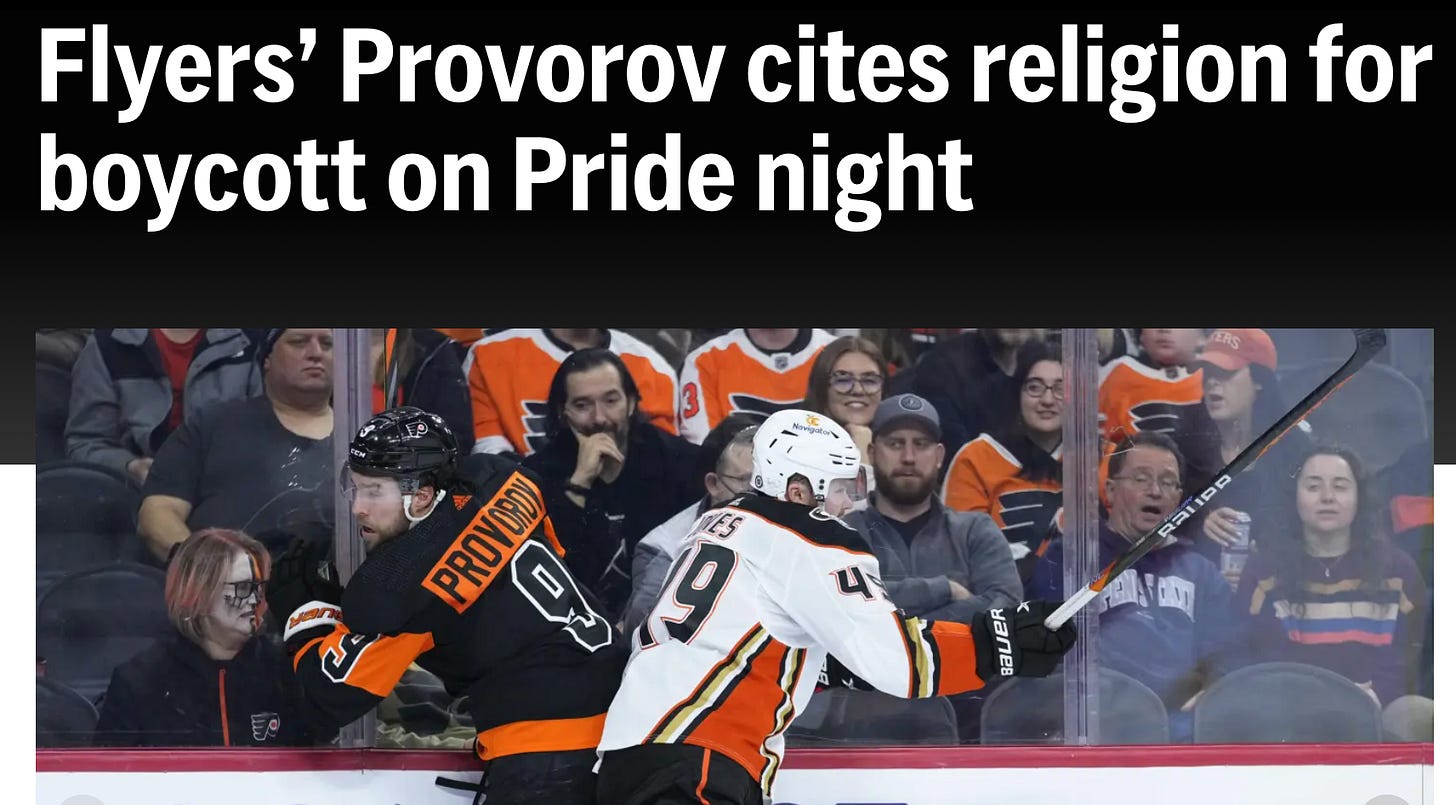
The NHL surely knows the value of Russian hockeyists and won’t allow all the aforementioned unpleasantness spoil the fans’ fun. Alexander Ovechkin may be the world’s most famous Putin cheerleader who has advocated for the war in Ukraine for nine years, but the league will search and destroy any journalist who so much as raises this question as it prepares to celebrate the shit out of his next scoring milestone. And Ivan Provorov may be a homophobic piece of garbage who shamelessly uses a long-dead Jewish man killed for telling us to love each other to justify his hate, but Gary Bettman will not only protect him from scrutiny, he will enshrine his homophobia into the league’s rule book.
Yes, Russians are so good in hockey, it almost serves as their get-out-of-jail-free card with certain folk. It’s no wonder Putin so desperately tries to cosplay a hockeyist: he knows it’s the easiest way to endear himself to the rest of the world or at least to Russia.
One almost has to wonder how a country that for approximately 99.9% of its history has been the world’s biggest prison block has managed to produce so much creativity and flair when it comes to sports involving ice. Might have something to do with the fact that the most celebrated battle in Russia’s military history took place on a frozen lake and proceeded according to the most cherished of all Russian tactics: charging ahead in unarmored human waves and letting heavily clad Teutonic knights chop them into coleslaw until the ice broke and dragged the heavy Germans to their highly befuddled ends.
As for the famed Russian hockey style, it was supposedly the invention of Anatoly Tarasov, a gregarious, foul-mouthed, 300 lbs of puck brilliance who is said to have eschewed the Canadian "dump-and-chase” barbarism and insisted on speedy, crafty, artful approach to the game. Tarasov would, allegedly, burn midnight oil to come up with ingenious passing combos, multi-layered breakouts and Renaissance-level feats of offensive tactical beauty and then would pound all of this genius into his obedient Soviet players in grueling training camps, endless practice sessions and regularly scheduled hours of lectures on the historical impact of the Marxist-Leninist approach to the penalty kill.
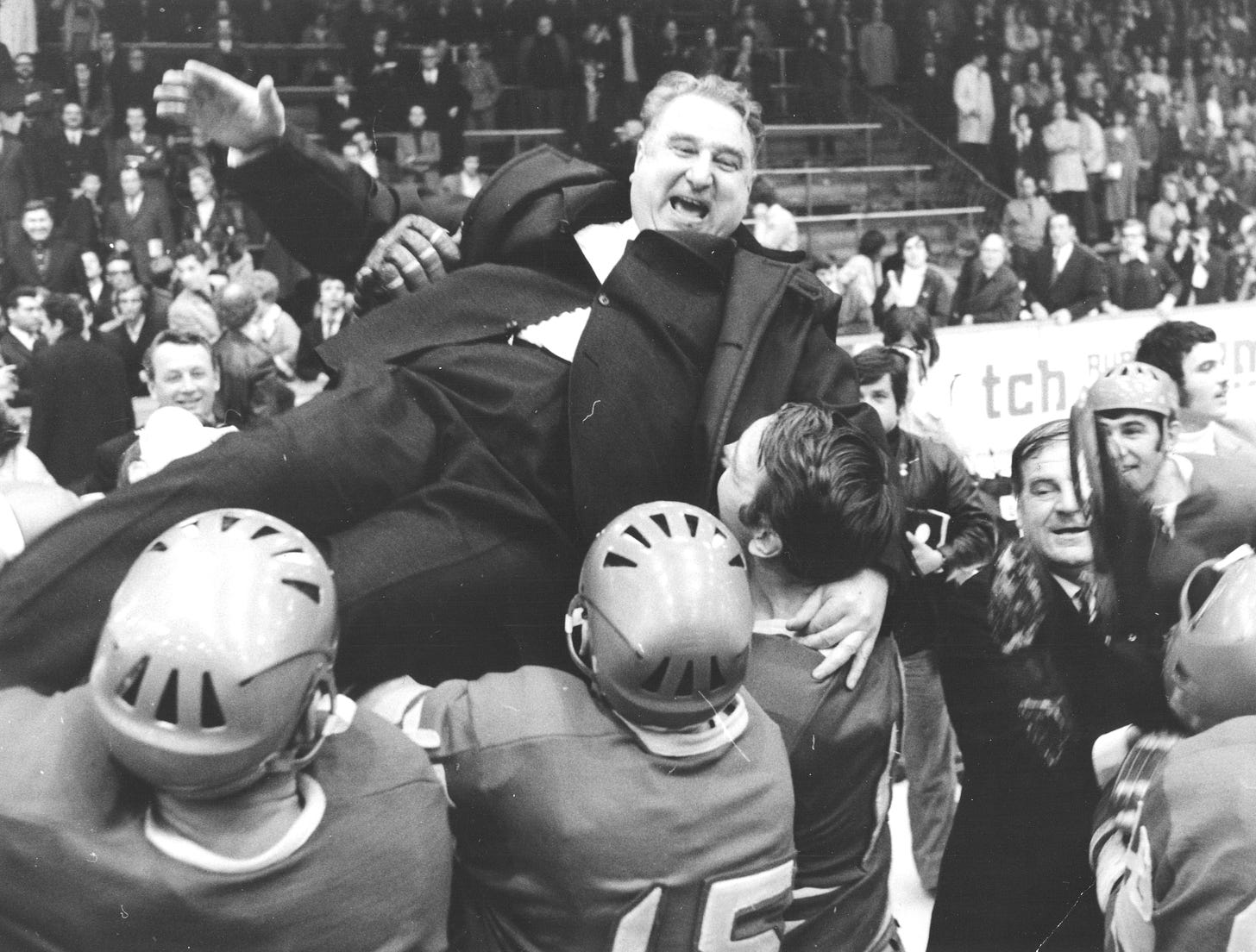
All of this happens to be true, if you discount the fact that Tarasov’s role in inventing the Soviet style of hockey is vastly overestimated. In fact, pretty much all of the theory was invented by his colleague Arkady Chernyshev, the coach of Dynamo Moscow, and Tarasov’s co-coach in the USSR national team. Chernyshev was the one who drew up the diagrams, developed the theory and worked out the line combinations, while Tarasov’s main talents lay in the areas of charisma, speaking well in front of cameras and screaming in players’ faces until they could make a combover with their eyebrows.
Yet it is Tarasov who is granted the title of Russia’s hockey daddy while Chernyshev is mostly forgotten. It’s like the life story of Shakespeare, except it’s real and with slightly better teeth. Well, Chernyshev probably has only himself to blame, since, according to nothing but his picture, the coach of the KGB team looked and acted exactly as forgettably as a good spy should.
Tarasov, of course, had another big advantage: the fact that in the Soviet Union, hockey was never viewed or regulated as a sport. Hockey was a part of the nation’s foreign politics, an area of human endeavor in which Russians could surpass the West and, therefore, prove to it that it’s inferior in whatever the hell. In fact, all the affairs of the Soviet national team were managed by the Propaganda Department of the Communist Party.
And it was the Soviet national team that mattered above all else. The professional hockey league of the USSR was never regarded seriously, as all of its results were predetermined: CSKA, the Army team, was designated as the eternal champion and won every single time. This happened because CSKA was allowed to use the compulsory military service to “draft” all the best players from the entire country to its roster. The other teams were not invited to debate this and had to give up their best talent for nothing. The Propaganda Department wanted all the top players concentrated in one club for the benefit of the national team.
And who was the coach of CSKA? Yes, indeed, Tarasov. The self-appointed Father of Russian Hockey. Thus, having assured himself of yearly league title, Tarasov had the easiest job in the world. Which it would have been, but wasn’t. And the reason for this was the same as the reason for all of Russia’s troubles, including epidemics, wars, bad weather and poor quality vodka: the Jews.
Well, one Jew in particular. Meet Nikolai Epshteyn, the founder and original coach of Khimik Voskresensk, a shoesting-budget club from a tiny working class town on the outskirts of Moscow.
Here is the thing about Jews in Russian hockey. There aren’t any. It’s true, don’t even try to check me on this. There were rumors circulating around a few ex national team players, Viktor Zinger (actually an ethnic German) and Vladimir Myshkin (100% Russian), and no, I have no idea why it had to be a goalie. Probably because it was always the ugly duckling of hockey positions.
But in fact, Jews were simply blacklisted from Soviet hockey for a variety of reasons. Most hockey players came from small industrial towns in the Urals and Siberia, where Jews were a rare sight. The Soviet national team was such an important political symbol of the country that a Jew could compromise its propaganda value in the era of systemic state-mandated antisemitism. And, quite simply, because Russian coaches, instilled with stereotypical images of weak, unathletic, cowardly, whiny, undisciplined Jews, would never pick a kid with a Jewish last name for their team. “Trus nye igrayet v hokkei” (A coward doesn’t play hockey) said the famous Russian song, but one can’t help but think that originally the first word of the verse was “Evrei”, Jew. Makes for a better rhyme, too.
Well, guess what, Nikolai Epshteyn was most definitely a Jew. And, as a hockey mind, he was absolutely Chernyshev’s equal and far superior to Tarasov. Operating out of a tiny town, relying on a local chemical plant for finances, playing in front of 3000 fans, having to scour the playgrounds and phys-ed classes for local talent (and then seeing all his best products promptly scooped up by CSKA), Epshteyn still managed to put together competitive teams.
In fact, his Khimik was more than competitive: it was constantly the thorn in CSKA’s side and had acquired the reputation of the Army team’s least favorite opponent. Epshteyn, playing with the equivalent of a Division III college team against the equivalent of the 1980s Edmonton Oilers, would utilize an early version of the neutral zone trap, using 4 defensemen and a single forward to suffocate CSKA’s famed offensive firepower.
Tarasov did not take this well. He raged and hollered. He called Epshteyn’s tactics “kike hockey.” He’d berate his players screaming: “You, Russian soldiers, can’t beat these hook-nosed dwarves? You can’t defeat this Voskresensk synagogue?!”
Not completely trusting the healing power of Nazi rhetoric, Tarasov also took this matter to the Central Committee of the Communist Party and demanded Epshteyn’s firing. Tarasov’s rationale was that his nemesis’ defensive approach was decidedly anti-Soviet, corrupting Russian players with foreign influences and constituted ideological poison, only to be expected from a Zionist charlatan like Epshteyn. Luckily for the latter, the Party officials didn’t feel like getting involved in the personnel decisions of a mid-level hockey club from the sticks, and he was allowed to keep coaching, eventually outlasting Tarasov himself.
The best part of this story is the irony. The irony of the antisemitic stereotypes that guide the way so many Russians see and treat Jews. The irony of the image of the wily, dishonest, sneaky, duplicitous Jew. Someone who Epshteyn never was and who Tarasov was his entire life. It was Tarasov, never liked by teammates in his playing days, who was nicknamed “Trotsky” for his sneakiness and braggadocio. It was Tarasov who dishonestly benefited from the USSR’s policy of stocking the Army team with best talent. It was Tarasov who unfairly appropriated other people’s fame and whined to the authorities when things didn’t go his way.
Tarasov, a pure-blooded Russian, was exactly the type of man that Russians imagine Jews to be. And it was Epshteyn, the unassuming, fearless leader of scrappy underdogs, who exemplified the qualities Russians imagine as their trademark.
Russian hockey, like much of Russian history, is mostly a gigantic, manufactured lie. Who knew?

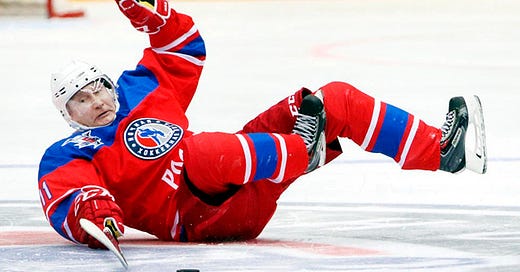




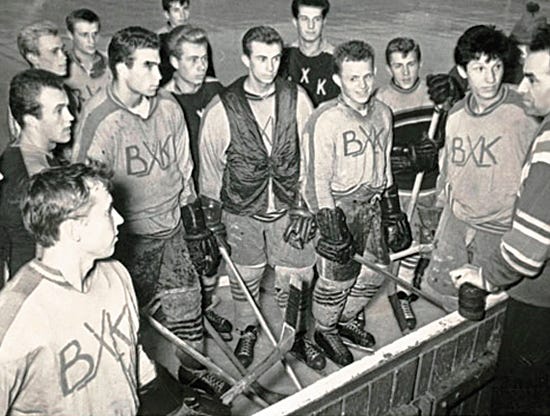
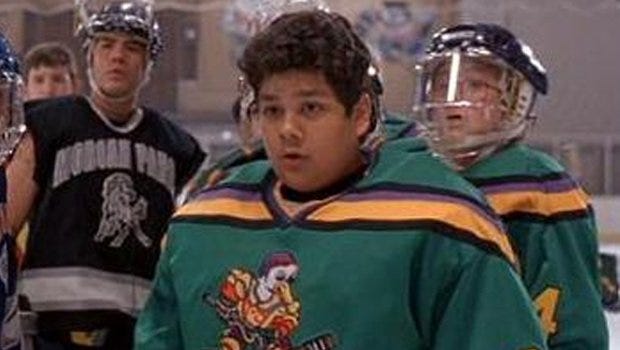

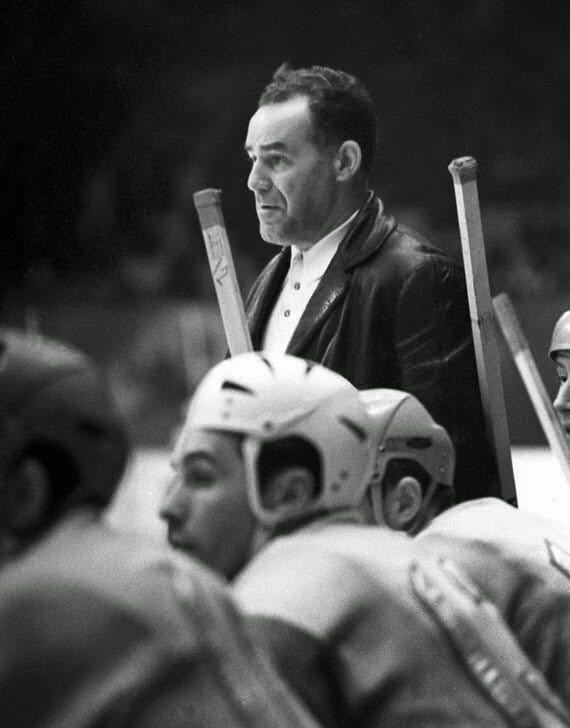

You should add the entire cult of victorious Red Machine is also largely a myth. The Soviet team won two (2!) truly best on the best hockey tournaments in its entire history: 1981 Canada Cup and 1979 Challenge Cup. Modern Russia team won 0.
If I remember correctly, in Igor Larionov's (English-language) autobiography, he gave a lot of credit to Epshteyn. Wonder how that story would change if the autobiography was published today...